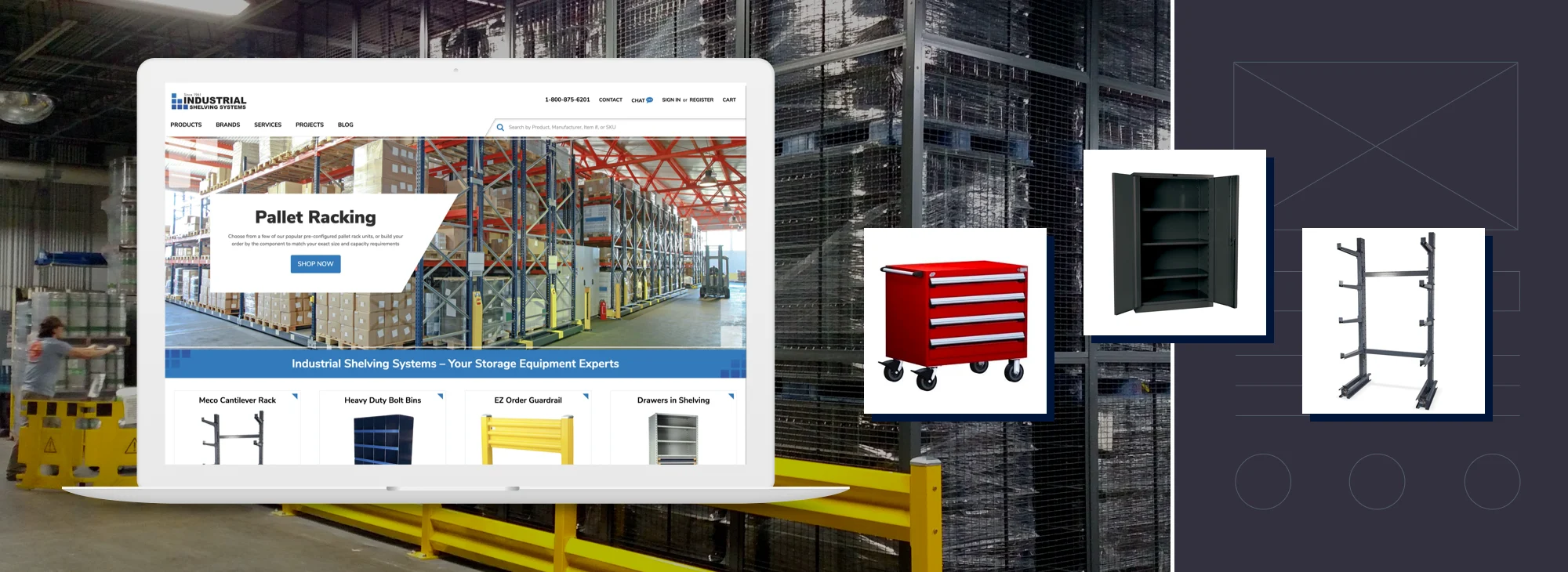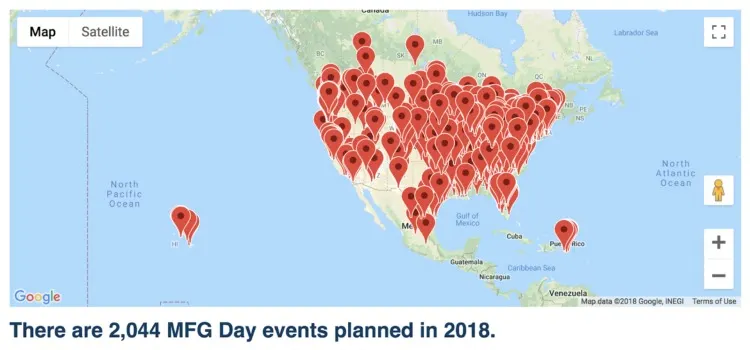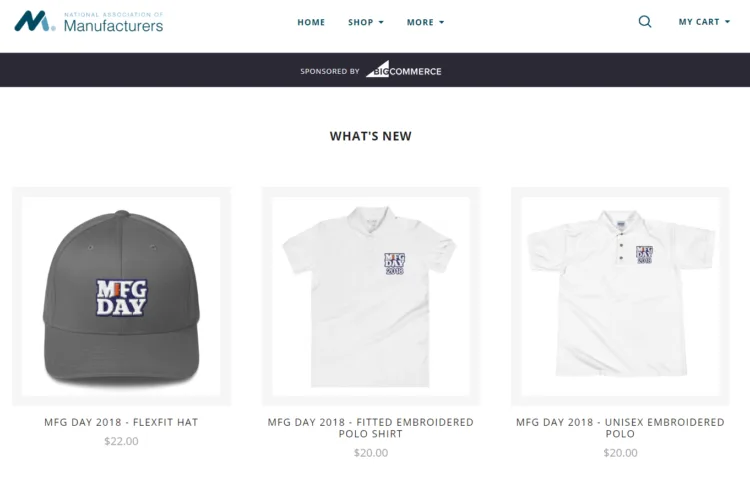Why You Should Care About National Manufacturing Day

I grew up in Beaumont, Texas – a small town near Houston on I-10.
The location had nothing to do with family roots.
When my grandparents moved to Beaumont, they came from North Texas, where they had deep family ties to the region.
Instead, I grew up in Beaumont, Texas because my family runs a manufacturing company producing pillows and cotton for luxury hotel chains and interior designers across the Gulf Coast region.
Beaumont, positioned as it is on I-10, the southernmost artery for the Gulf Coast, with cheaper rents than Houston, only 90 miles away, had the perfect blend of geographic factors for our growing business back in the 1960s.
It has served our third generation family manufacturing business with nearly 100 employees well over the last six decades.
There, we have weathered hurricanes and foam fires, balanced growing environmental regulations with additional hires at increasing hourly wages.
We’ve also had our fair share of local press, high school football games, holiday celebrations and the loss of loved ones.
My family knows no bounds between work and home life. It is all one in the same.
And, I know well that I am not the only daughter of manufacturers to have grown up this way.
Manufacturing is, after all, the lifeblood of local, national and global economies.
Without it:
No goods land on the shelves of household name stores.
No direct-to-consumer company would ever exist.
No affordable goods economy could be created.
Manufacturers do this work – the gritty work. In warehouses often called “plants,” managing not just the needs of inventory, but the creation of the goods, the human capital it takes to produce them, and the freight costs required to get them where they need to go.
And once a year, there is a day, as there should be, dedicated to celebrating and supporting the manufacturers that make our retail ecosystem come to life.
It is known as Manufacturing Day.
What is Manufacturing Day?
Manufacturing Day is the celebration of manufacturing practices that build local, national and global economies.
The goal of Manufacturing Day is to inspire the next generation of manufacturers, and educate the public at large on the importance of the role manufacturers play in our daily lives and the growing skill shortage despite the high volume of job openings in the sector.
The first Manufacturing Day was held in 2012, with growing participation throughout the U.S. since.
When is Manufacturing Day?
Manufacturing Day occurs every year on the first Friday in October.
This year Manufacturing Day is on October 2, 2020.
What is the Mission of Manufacturing Day?
Manufacturing Day is put on by the Manufacturing Institute, the social impact arm of the National Association of Manufacturers (NAM).
The mission of Manufacturing Day is to promote modern manufacturing practices and jumpstart new approaches to growing the manufacturing talent pool.
The true mission of manufacturing day is to build a steady pipeline of qualified workers.
Over the next decade, there are expected to be 3.5 million job openings in manufacturing, with a growing skill shortage.
The main priorities of Manufacturing Day as listed by the Manufacturing Institute are:
Change the perception of careers in manufacturing to reflect its true status as the most advanced, high-tech industry in the country.
Re-establish the U.S. as the global leader of manufacturing education.
Advocate for education and job training policies that strengthen the U.S. manufacturing workforce.
The ultimate goal is to help manufacturers build a steady pipeline of qualified and diversified manufacturing talent to help build and support local economies for decades to come.
First-hand experience with manufacturers changes individual opinion, and steady job opportunities provide local and national economic predictability.

The Importance of Manufacturers in the Ecommerce Industry
Without manufacturers, our retail ecosystem could not exist.
Almost every single product any consumer buyers is the production of an established manufacturer which worked closely with the brand to create a custom product.
Let’s look a few stats to prove the importance of this sector:
1. In the U.S. alone, manufacturers contributed $2.33 trillion to the U.S. economy in the first quarter of 2019.
This number has risen increasingly since 2009.
In 2017, manufacturing accounted for 11.6% of GDP.
Taken alone, manufacturing in the United States would be the 9th largest economy in the world.
2. Manufacturing has the highest multiplier effect of any economic sector.
For every $1.00 spent in manufacturing, another $1.89 is added to the economy.
For every one worker in manufacturing, there are another four employees hired elsewhere.
Taking the additional hires down the stream into account brings us up to $3.60 for every $1.00 spent in manufacturing.
3. There are currently 12.75 million manufacturing workers in the United States, accounting for 8.6% of the workforce.
Since the end of the Great Recession, manufacturers have hired an additional 1.3 million workers.
And, in 2017, the average manufacturing worker in the United States earned $84,832 annually, including pay and benefits.
The average worker in all nonfarm industries earned $66,847.
Looking specifically at wages, the average manufacturing worker earned more than $27 per hour, according to the latest figures, not including benefits.
Over the next decade, nearly 3½ million manufacturing jobs will likely be needed, and 2 million are expected to go unfilled due to the skills gap.
Moreover, according to a recent report, 80% of manufacturers report a moderate or serious shortage of qualified applicants for skilled and highly-skilled production positions.
4. Manufacturing has seen a nearly 2X the productivity increases over the last two decades than other economic sectors.
Output per hour for all workers in the manufacturing sector has increased by more than 2.5X since 1987.
In contrast, productivity is roughly 1.7X greater for all nonfarm businesses.
Durable goods manufacturers have seen even greater growth, almost 3X labor productivity over that time frame.
5. Manufacturers in the United States perform more than three-quarters of all private-sector research and development (R&D) in the nation, driving more innovation than any other sector.
R&D in the manufacturing sector has risen from $126.2 billion in 2000 to $229.9 billion in 2014.
In the most recent data, pharmaceuticals accounted for nearly one-third of all manufacturing R&D, spending $74.9 billion in 2014. Aerospace, chemicals, computers, electronics and motor vehicles and parts were also significant contributors to R&D spending in that year.
6. The cost of federal regulations fall disproportionately on manufacturers, particularly those that are smaller.
Manufacturers pay $19,564 per employee on average to comply with federal regulations, or nearly double the $9,991 per employee costs borne by all firms as a whole.
In addition, small manufacturers with less than 50 employees spend 2.5 times the amount of large manufacturers. Environmental regulations account for 90% of the difference in compliance costs between manufacturers and the average firm.
Finding MFG Day Events Near You

You can use the Manufacturing Day’s website to find an event near you.
You can also support Manufacturing Day by buying Manufacturing Day merchandise. BigCommerce isa proud sponsor of the day and is happy to provide a free website for all the non-profit to sell their goods.

Executive Summary
There is a growing shortage is manufacturing skills, and a quickly rising increase in available job opportunities in the manufacturing industry.
Manufacturing Day is only one such effort to raise awareness around a large industry pain point.
As a retailer and as a consumer, you can help by reaching out to your manufacturer, participating in local events, and understanding the larger impact of manufacturing industry on our economic stability.
My family and the families of millions of workers thank you for your support.

Tracey is the Director of Marketing at MarketerHire, the marketplace for fast-growth B2B and DTC brands looking for high-quality, pre-vetted freelance marketing talent. She is also the founder of Doris Sleep and was previously the Head of Marketing at Eterneva, both fast-growth DTC brands marketplaces like MarketerHire aim to help. Before that, she was the Global Editor-in-Chief at BigCommerce, where she launched the company’s first online conference (pre-pandemic, nonetheless!), wrote books on How to Sell on Amazon, and worked closely with both ecommerce entrepreneurs and executives at Fortune 1,000 companies to help them scale strategically and profitably. She is a fifth generation Texan, the granddaughter of a depression-era baby turned WWII fighter jet pilot turned self-made millionaire, and wifed up to the truest of heroes, a pediatric trauma nurse, who keeps any of Tracey’s own complaints about business, marketing, or just a seemingly lousy day in perspective.


